Nursing is one of the most rewarding careers out there—but it’s also demanding. It takes a long time to get a nursing degree. And sometimes, life pulls you in another direction.
Maybe you’re caring for your family, going back to school, focusing on your health, or simply taking a much-needed break.
Whatever the reason, stepping away from nursing doesn’t mean you want to give up your hard-earned credentials. That brings up an important question: how to keep nursing license active when not working?
Here’s the good news: in most states, you can keep your license active even if you’re not currently employed. The process usually involves renewing your license on time, completing the required Continuing Education Units (CEUs), and paying renewal fees.
Requirements to Keep Nursing License Active When Not Working
You might have started your career as a nurse because you like to help people. But you have to accept that the working environment, the degree-based salary structure and other related perks are also a big reason for joining.
If you have to leave your nursing practice to fulfill other duties in life, it’s a wise decision to keep nursing license active when not working professionally. But how to?
1. Continuing Education Requirements for Inactive Nurses
If you’re taking time away from the bedside, you might wonder: how can I keep my license active if I’m not practicing? The answer almost always comes back to one thing—continuing education requirements for inactive nurses.
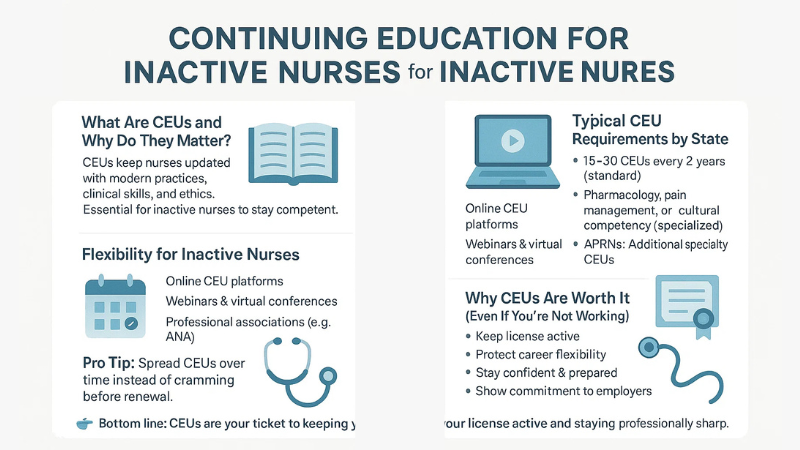
What Are CEUs and Why Do They Matter?
CEUs (Continuing Education Units) are short courses designed to keep nurses up to date with modern practices, clinical skills, and professional ethics. Think of them as a way to “refresh” your nursing knowledge, much like a tune-up keeps your car running smoothly.
Even when you’re not actively working, your state board of nursing wants to make sure you remain competent and safe to re-enter the workforce. CEUs are their way of ensuring you stay connected to the latest standards of care.
For inactive nurses, CEUs are especially important because you’re not gaining that same daily, hands-on learning you would in a hospital or clinic. These courses bridge the gap between being away from practice and staying professionally ready.
Typical CEU Requirements by State
While rules vary depending on where you live, here’s what most nurses can expect:
- Standard requirement: Most states require 15 to 30 CEUs every two years.
- Specialized courses: Some states require CEUs in targeted areas. For example:
- Pharmacology updates for nurses who prescribe or administer medications.
- Pain management and opioid education in states impacted by opioid crises.
- Cultural competency or ethics courses to strengthen patient-centered care.
- Advanced practice nurses (APRNs): Often face additional requirements, such as CEUs specifically tied to their specialty (family practice, anesthesia, pediatrics, etc.).
It’s important to check directly with your state board of nursing, because requirements can differ widely.
Flexibility for Inactive Nurses
One of the biggest advantages today is that you don’t need to be in a classroom to earn CEUs. If you’re taking a career break, you can still meet requirements conveniently through:
- Online CEU platforms: Accredited websites offering courses you can complete at home, anytime.
- Webinars and virtual conferences: Great for nurses who want interactive learning without travel.
- Professional associations: Organizations like the American Nurses Association (ANA) often provide CEU opportunities tailored to your specialty.
This flexibility is a game-changer for nurses balancing family responsibilities, health challenges, or other commitments during their time away from work.
Why CEUs Are Worth It (Even If You’re Not Working)
It might feel frustrating to keep taking classes when you’re not currently using the knowledge. But here’s why it’s worth the effort:
- Keep your license active – avoiding the stress of reactivation later.
- Protect your career flexibility – you can return to work quickly if an opportunity comes up.
- Keep your confidence high – you’ll feel more prepared to re-enter patient care.
- Shows commitment – employers value nurses who maintain their license even during breaks.
Pro Tip for Inactive Nurses
Don’t wait until the last minute. CEUs are much easier to complete when you spread them out over time. For example, doing 1–2 courses every few months is less stressful than cramming 30 hours right before renewal.
Bottom line: Continuing education requirements for inactive nurses are not just a formality—they’re your ticket to keeping your license active, staying professionally sharp, and returning to nursing without roadblocks.
2. Renewing RN License Without a Current Job
One of the biggest worries for nurses taking time off is whether they can still renew their RN license without a current job. The good news? In most states, the answer is yes—you don’t have to be actively employed in nursing to keep your license valid.
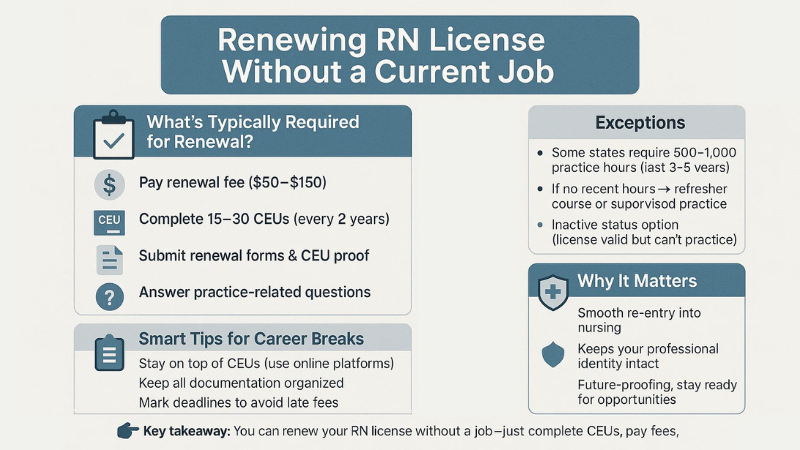
What’s Typically Required for Renewal?
While details differ from state to state, here are the most common steps you’ll need to follow:
- Paying the renewal fee –
Usually ranges from $50 to $150 depending on your state board of nursing.
- Completing your CEUs –
Most states require 15–30 hours of continuing education every two years (sometimes more if you’re an APRN or in a specialty).
- Submitting renewal forms –
This often includes proof of identity and documentation of your completed CEUs.
- Answering practice-related questions –
Some applications ask whether you’ve worked in nursing recently, but in most cases, answering “no” doesn’t block your renewal.
Are There Any Exceptions?
Yes. A few states go beyond CEUs and fees, requiring proof of recent practice to renew your license. For example:
- Practice hours rule: Some states ask for 500 to 1,000 clinical practice hours within the last 3–5 years.
- No recent hours? If you haven’t practiced, you might need to complete a refresher course or supervised clinical hours.
- Inactive status: Some boards allow you to place your license on inactive status, meaning you don’t meet CEU or work-hour requirements, but you can’t practice until you reactivate.
What If You’re on a Career Break?
If you’re not currently working, here are some smart ways to keep things simple:
- Stay on top of CEUs: Online CEU platforms are flexible and can be completed at your own pace.
- Keep all documentation: Save certificates and receipts in a folder or digital file—you’ll need them at renewal time.
- Know your deadlines: Mark your renewal date on a calendar or set reminders to avoid late fees or lapses.
Why Renewing Without a Job Still Matters
It may feel tempting to let your license lapse if you’re not working, but that creates big headaches down the road. Here’s why it’s worth the effort:
- Smooth re-entry: You can return to nursing immediately when ready, without re-taking exams or long refresher courses.
- Keeps your professional identity intact: Even if you’re not bedside, maintaining your RN license shows ongoing commitment to your career.
- Future-proofing: Life can change quickly—having an active license keeps opportunities open.
Key takeaway: In most states, renewing your RN license without a current job is completely possible. As long as you pay your renewal fee, complete your CEUs, and follow state requirements, you’ll be able to keep your license active—even during a break from practice.
3. Maintain Nursing Credentials on a Career Break
Taking a break from bedside nursing doesn’t mean you have to step away from your professional identity. In fact, staying connected to the field while you’re away can make it much easier to return when you’re ready. The key is knowing how to maintain nursing credentials on a career break without feeling overwhelmed.
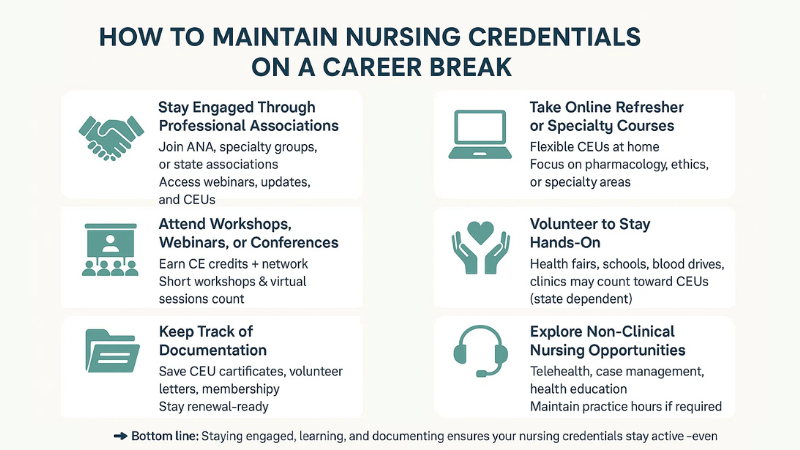
Here are some effective strategies:
Stay Engaged Through Professional Associations
- Join organizations such as the American Nurses Association (ANA), specialty nursing groups, or your state’s nursing association.
- Membership often includes newsletters, webinars, policy updates, and reduced fees for CEUs.
- Staying connected helps you keep up with healthcare changes and gives you a professional community, even if you’re not working.
Take Online Refresher or Specialty Courses
- Many platforms offer flexible, state-approved CEUs you can complete from home.
- Consider refresher courses in pharmacology, ethics, or emerging technologies—these are areas that change quickly.
- If you plan to shift specialties later (e.g., moving from med-surg to pediatrics), taking courses in your target field can give you a head start.
Attend Workshops, Webinars, or Conferences
- Local and national conferences are a great way to earn CE credits while networking.
- Short workshops (often offered by hospitals or universities) can help you stay familiar with new clinical tools and standards.
- Even virtual webinars can count toward your CEU requirements.
Volunteer to Stay Hands-On
- Volunteer at community health fairs, schools, blood drives, or local clinics.
- Some states allow certain volunteer hours to count toward competency or CEU requirements.
- Even if they don’t, volunteering helps keep your clinical confidence alive while showing ongoing engagement with healthcare.
Keep Track of Documentation
- Maintain a folder (digital or paper) with CEU certificates, volunteer letters, and association memberships.
- When renewal comes around, you’ll have everything ready to submit without scrambling for records.
Explore Non-Clinical Nursing Opportunities
- Consider part-time or flexible roles such as telehealth triage, case management, or health education.
- Even minimal hours in these areas can help you maintain active practice requirements if your state mandates them.
Bottom line: You don’t have to be at the bedside to remain a nurse. By engaging in professional development, volunteering, and staying connected to the nursing community, you can confidently maintain your credentials and make re-entry smooth whenever you’re ready.
4. Beware of Inactive Nursing License Renewal Rules
When you step away from bedside care, your license doesn’t automatically disappear. Instead, your state board of nursing gives you options: keep it active, place it on inactive status, or risk it becoming lapsed/expired. Understanding the differences is critical if you plan to return to practice later.
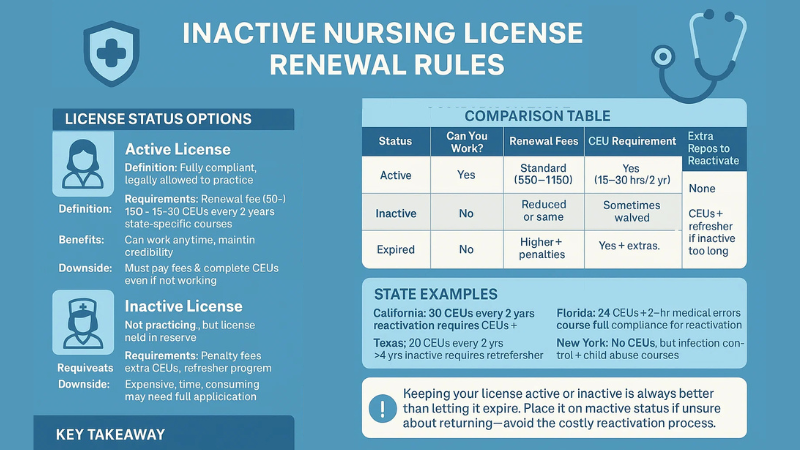
Active License
- Definition: You’re fully compliant with renewal requirements and legally allowed to practice.
- Requirements (general):
- Renewal fee (usually $50–$150 depending on the state).
- Continuing Education Units (CEUs), typically 15–30 hours every 2 years.
- Any mandatory state-specific courses (e.g., infection control, opioid prescribing, or medical errors).
- Benefits:
- You can step back into a nursing role at any time without reactivation delays.
- Keep your professional credibility intact.
- Downside: You may pay renewal fees and complete CEUs even while not working.
Inactive License
- Definition: You notify the state board that you are not currently practicing, but you want to hold your license in reserve.
- Requirements (general):
- Renewal fees may be reduced or waived (varies by state).
- CEUs might not be required while inactive, but most states require them to reactivate.
- When It’s Useful:
- Taking a multi-year career break (parenting, education, illness, military relocation).
- Unsure when you’ll return but don’t want to start from scratch.
- To Reactivate:
- You may need to show proof of CEUs, retake a refresher course, or verify recent clinical competency.
- Example: Some states require a refresher if you’ve been inactive for more than 5 years.
Lapsed/Expired License
- Definition: You missed the renewal deadline and took no action.
- Requirements to Reinstate:
- Pay penalty fees (sometimes double or triple the normal renewal fee).
- Complete additional CEUs or refresher programs.
- In some states, you may even need to reapply as a new nurse if your license has expired for too long.
- Downside: The most time-consuming and expensive option. Many nurses regret letting their license lapse because reinstatement can feel like starting over.
Comparison Table – License Status Options
Status | Can You Work | Renewal Fees | CEU Requirements | Extra Steps to Reactivate |
Active | Yes | Standard ($50–$150) | Yes (15–30 hrs/2 yrs) | None (you’re ready to practice anytime) |
Inactive | No | Reduced or the same as active | Sometimes waived until reactivation | CEUs + possible refresher if inactive too long |
Expired | No | Higher, with penalties | Yes, plus extra courses | Often requires refresher, competency testing, or full reapplication |
Examples of State-Specific Rules
- California:
- 30 CEUs every 2 years, regardless of employment.
- Inactive licenses can be reactivated by completing CEUs and paying the active renewal fee.
- Texas:
- 20 CEUs every 2 years OR completion of a nursing-related academic course.
- Nurses who let their license lapse more than 4 years must complete a refresher course.
- Florida:
- 24 CEUs + 2-hour medical errors course every 2 years.
- Inactive license reactivation requires full CE compliance before returning to practice.
- New York:
- No CEU hour requirement, but must complete mandatory infection control and child abuse reporting
- If lapsed for a long period, additional verification may be requested.
Key Takeaways
- Keeping your license active or inactive is always better than letting it lapse/expire.
- Inactive nursing license renewal rules vary by state, but most boards make reactivation easier than full reinstatement.
- Always check your state’s Board of Nursing website because requirements can change.
- Set calendar reminders—many nurses unintentionally let their license lapse simply by missing deadlines.
Pro tip: If you’re unsure about returning to nursing, place your license on inactive status instead of letting it expire. This will save you time, money, and stress in the future.
5. Keep Nursing License Active While Not Practicing
Taking a break from nursing doesn’t mean you should let your hard-earned license slip away. If you keep it active, you can get a wide variety of career choices when you decide to return.
Even if you’re not working at the bedside, keeping your credentials active ensures that when you’re ready to return, you won’t face unnecessary stress, costs, or delays.
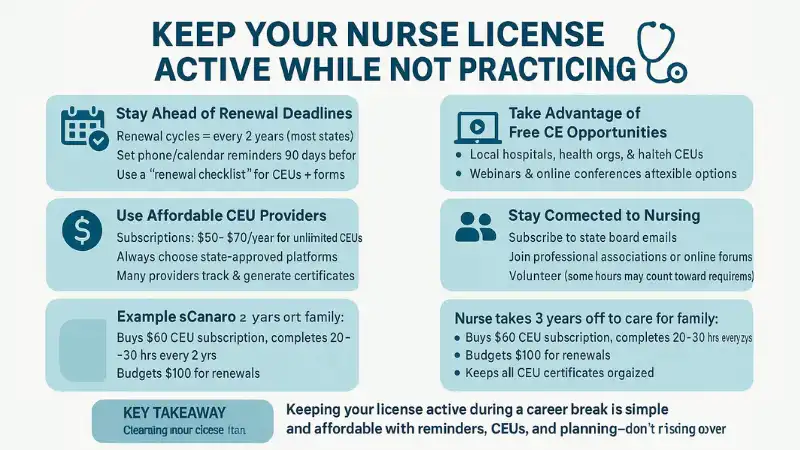
Here are some practical strategies to help you keep your nursing license active while not practicing:
Stay Ahead of Renewal Deadlines
- Every state has strict renewal cycles (usually every 2 years).
- Tip: Set reminders on your phone, calendar, or email at least 90 days before your license expires. This gives you plenty of time to complete CEUs and submit paperwork.
- Some nurses even keep a “renewal checklist” taped near their desk or synced with their work planner.
Use Affordable CEU Providers
- Many online CEU providers offer annual subscriptions ($50–$70) with unlimited access to courses. This is far cheaper than paying per credit hour.
- Look for state-approved CEU platforms so you don’t waste time on courses your board won’t accept.
- Bonus: Subscription-based CEU sites often track your progress and generate certificates you can submit directly.
Take Advantage of Free CE Opportunities
- Professional associations (like the American Nurses Association) often provide free CEUs to members.
- Hospitals, community health organizations, and even local health departments frequently offer free or low-cost workshops.
- Webinars and online conferences are another great way to meet requirements while staying connected to the nursing world.
Budget for Renewal Fees in Advance
- Renewal fees typically range from $50 to $150, depending on the state.
- If you’re on a career break, it helps to set aside this money in a small “license fund” so you’re not caught off guard.
- Think of it as an investment — keeping your license active is far cheaper than reactivating or reinstating after it lapses.
Stay Connected to Nursing Even if You’re Not Working
- Join your state nursing board’s email list to stay updated on rule changes.
- Participate in professional networks or online nursing forums.
- Volunteer in healthcare settings (some volunteer hours may even count toward competency or CEU requirements in certain states).
Example Scenario
Imagine you’re taking 3 years off to care for a family member. Instead of letting your license lapse, you:
- Purchase a $60 CEU subscription and complete 20–30 hours every 2 years.
- Budget $100 per renewal cycle.
- Keep track of all CEU certificates in a folder.
Result? When you’re ready to return, you walk back into nursing with no reactivation delays, refresher courses, or penalty fees.
Key takeaway: Keeping your nurse license active while not practicing isn’t complicated. With reminders, affordable CEUs, and a little planning, you’ll protect your professional future and avoid the stress of starting over.
What to Do If Your License Has Lapsed
Sometimes life gets busy — between family, personal health, or simply losing track of time, it’s easy to miss a renewal deadline. If your nursing license has lapsed, don’t panic. You’re not alone, and reactivation is absolutely possible. It just requires extra steps compared to standard renewal.
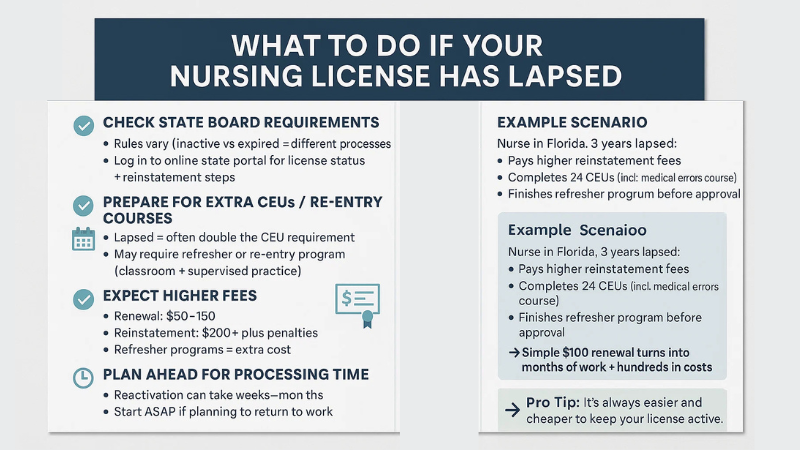
Here’s what to do if your nursing license has lapsed:
Check Your State Board of Nursing Requirements
- The first step is always your state board of nursing website, since rules vary widely.
- Some states consider a license “inactive” after the deadline, while others mark it as “expired.” The difference matters because reinstatement processes can vary.
- Many states provide an online portal where you can log in, view your status, and begin the reinstatement process.
Prepare for Additional CEUs or Re-Entry Programs
- Unlike a standard renewal, lapsed licenses often require extra continuing education hours — sometimes double the normal requirement.
- If you’ve been away from practice for several years, you may be required to complete a refresher or re-entry course, which includes both classroom and supervised clinical practice.
- These programs are designed to ensure you’re safe and competent to return to patient care.
Expect Higher Fees
- Standard renewal fees usually range from $50–$150, but reinstatement fees can be $200 or more, depending on the state.
- You may also need to pay a penalty for missing deadlines, plus the cost of refresher courses if required.
Provide Proof of Competency
- State boards may ask for:
- Certificates of CE completion
- Documentation of recent practice hours (if you worked in nursing-related roles)
- Proof of completing a refresher course or supervised clinical hours
- Some states even require background checks if your license has expired for several years.
Plan for Processing Time
- Reactivation isn’t instant. Depending on the requirements, it can take weeks to months before your license is reinstated.
- If you’re hoping to return to work quickly, start the process as soon as you realize your license has lapsed.
Example Scenario
Imagine a nurse in Florida forgets to renew for 3 years. To return, they must:
- Pay higher reinstatement fees.
- Complete 24 CEUs (including required courses like medical errors).
- Provide proof of refresher training since they’ve been out of practice.
What could have been a simple $100 renewal now costs hundreds of dollars and several months of effort.
Pro tip: Don’t let your license lapse if you can avoid it. It’s always faster, easier, and cheaper to keep your license active than to go through the reactivation process.
Conclusion
Taking a career break doesn’t mean you have to give up your hard-earned license. With a little planning, you can keep your nursing license active even when you’re not working. Whether it’s completing your CEUs on time, setting reminders for renewal deadlines, or budgeting for fees, these small steps make a big difference in protecting your credentials.
Think of your license as more than just paperwork — it’s your professional identity and your ticket back into the field whenever you’re ready. Life may pull you in different directions, but keeping your license active ensures that nursing will always be waiting for you.
FAQ: Keep Nursing License Active When Not Working
Can I renew my nursing license if I’m not working?
Yes. Most states only require CEUs and renewal fees, not active employment.
How many CEUs do inactive nurses need?
Usually 15–30 hours every 2 years, depending on your state.
What happens if I let my nursing license expire?
You may need to complete extra CEUs, refresher courses, and pay penalties before reinstating your license.
Do I need clinical hours to maintain my license?
Only in some states. Others allow CEUs as proof of ongoing competency.
How do I keep my RN license active during a long career break?
Plan ahead by completing CEUs online, paying fees on time, and staying connected through workshops or associations.

Leave a Reply